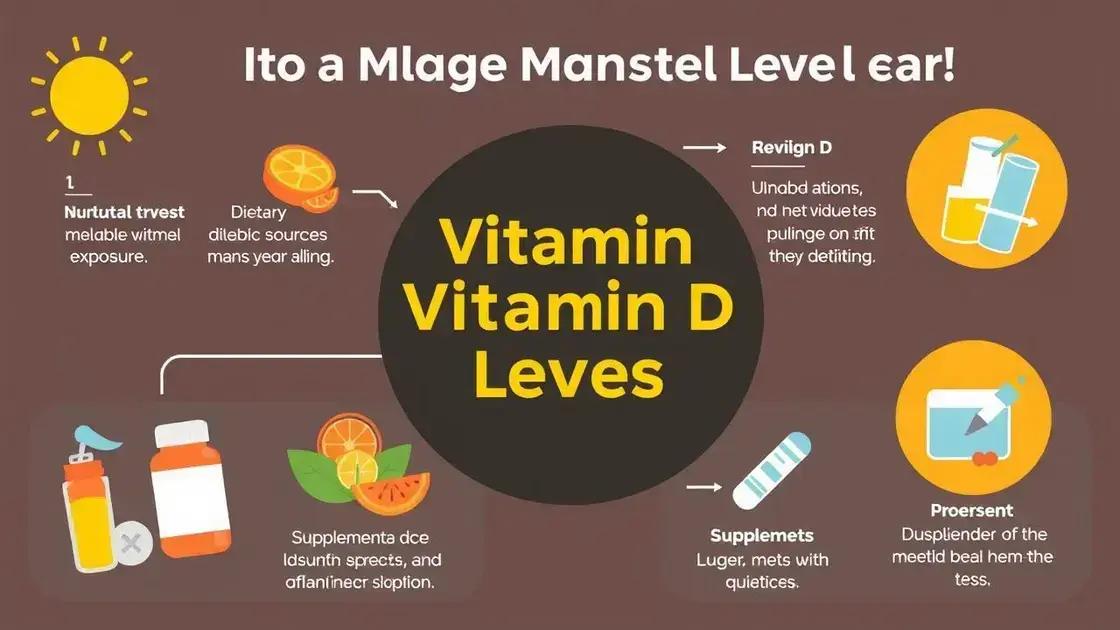The importance of properly managing vitamin D levels lies in its critical role for bone health, immune function, and overall well-being. Key methods include regular sunlight exposure, a diet rich in vitamin D, and supplementation when necessary. Recognizing signs of deficiency, such as fatigue and mood changes, is essential for maintaining optimal health.
Vitamin D is essential for our overall health, playing a crucial role in bone health and immune function. Properly managing vitamin D levels is vital, as deficiency can lead to serious health issues. This article will explore the importance of maintaining adequate vitamin D, the signs of deficiency, and effective strategies to boost your levels through sunlight exposure and supplements.
What is Vitamin D and Its Benefits?

Vitamin D is a fat-soluble vitamin essential for maintaining several bodily functions. It plays a critical role in absorbing calcium and phosphorus, which are vital for healthy bones and teeth. Without adequate vitamin D, our bones can become weak, increasing the risk of fractures.
Benefits of Vitamin D
There are numerous benefits associated with sufficient vitamin D levels:
- Bone Health: It helps maintain bone density and strength, preventing conditions like osteomalacia and osteoporosis.
- Immune Function: Vitamin D is crucial for a well-functioning immune system, helping to fend off illnesses and infections.
- Mood Regulation: Studies suggest that adequate vitamin D levels can help alleviate symptoms of depression and improve overall mood.
- Heart Health: Some studies have shown that vitamin D may play a role in heart health by reducing the risk of cardiovascular diseases.
It is important to ensure that you are getting enough vitamin D, as low levels can lead to serious health issues over time. Regular check-ups and monitoring can help maintain optimal levels.
Signs of Vitamin D Deficiency

Vitamin D deficiency can lead to several signs and symptoms. Recognizing these early is important for taking timely action. Here are common signs of a deficiency:
- Fatigue: Feeling overly tired or exhausted can be a sign that your body is lacking vitamin D.
- Pain in Bones and Muscles: Unexplained bone pain or muscle weakness can indicate low levels of vitamin D.
- Frequent Illness: Since vitamin D plays a role in immune function, frequent colds or infections may signal a deficiency.
- Depression: Some research links low vitamin D levels with increased feelings of sadness and depression.
- Hair Loss: Severe hair loss, particularly in women, can sometimes be connected to low vitamin D levels.
- Slow Wound Healing: If your cuts and bruises take longer to heal, it could be due to inadequate vitamin D.
It is crucial to pay attention to these signs. If they occur, consult with a healthcare provider for testing and potential solutions.
Ways to Manage Your Vitamin D Levels

Managing your vitamin D levels is essential for overall health. Here are some effective ways to ensure you maintain adequate levels:
- Sunlight Exposure: Getting outside for at least 15 minutes each day can help your body produce vitamin D naturally. Aim for midday sun when UVB rays are strongest.
- Dietary Sources: Incorporate foods rich in vitamin D, such as fatty fish (like salmon and mackerel), egg yolks, cheese, and fortified foods like milk, orange juice, and cereals.
- Supplements: If you have trouble getting enough vitamin D from sunlight and diet, consider vitamin D supplements. Consult a healthcare provider to determine the right dosage for you.
- Regular Testing: Have your vitamin D levels checked through blood tests. This will help you understand if you need to adjust your intake.
- Healthy Weight Management: Maintaining a healthy body weight can help optimize vitamin D levels, as obesity can affect vitamin D metabolism.
Implementing these strategies can significantly improve your vitamin D levels and boost your overall health.
The Role of Sunlight and Supplements

The role of sunlight and supplements in managing vitamin D levels is crucial for maintaining good health. Sunlight exposure is one of the most natural ways for our bodies to produce vitamin D. When UVB rays from the sun hit our skin, they initiate a process that converts cholesterol into vitamin D.
- Sunlight: Aim for about 15-30 minutes of sunlight exposure several times a week. Factors like time of day, skin type, and geographical location can affect how much vitamin D your body produces. For instance, people with lighter skin can produce vitamin D more quickly than those with darker skin.
- Seasonality: During winter months, or if you live in a place with limited sunlight, it may be difficult to get enough vitamin D from the sun alone.
- Supplements: Supplements can effectively bridge the gap when sunlight is insufficient. Vitamin D3 (cholecalciferol) is the recommended form, as it is more effective at raising vitamin D levels in the body compared to D2 (ergocalciferol).
- Choosing the Right Dosage: It’s important to consult with a healthcare professional to determine the right dosage of vitamin D supplements based on your individual needs.
Incorporating both sunlight and supplements can help ensure you maintain adequate vitamin D levels for optimal health.
Maintaining Healthy Vitamin D Levels
Properly managing vitamin D levels is vital for overall health and well-being. By understanding the importance of vitamin D, recognizing the signs of deficiency, and implementing effective ways to manage your levels through sunlight exposure and supplements, you can significantly enhance your quality of life.
Incorporating vitamin D-rich foods into your diet and being mindful of your daily sun exposure are both important steps. Regular check-ups with your healthcare provider will ensure you’re on the right track.
With consistent awareness and proactive measures, you can maintain healthy vitamin D levels and enjoy the numerous benefits it offers, from stronger bones to improved immune function.
FAQ – Frequently Asked Questions About Managing Vitamin D Levels
What is vitamin D and why is it important?
Vitamin D is a fat-soluble vitamin crucial for bone health, immune function, and overall well-being. It helps the body absorb calcium and phosphorus.
How can I tell if I am vitamin D deficient?
Common signs of vitamin D deficiency include fatigue, bone pain, frequent illness, and mood changes. A blood test is the best way to confirm deficiency.
What are the best sources of vitamin D?
The best sources include sunlight exposure, fatty fish, egg yolks, fortified foods, and vitamin D supplements.
How much sunlight do I need to get enough vitamin D?
Most people need about 15-30 minutes of sunlight several times a week, depending on skin type and location.
Are vitamin D supplements safe?
Vitamin D supplements are generally safe when taken within recommended dosages. It’s best to consult a healthcare provider for guidance.
Can I get enough vitamin D in winter?
In winter, you may need to rely more on dietary sources and supplements, especially in regions with limited sunlight.













